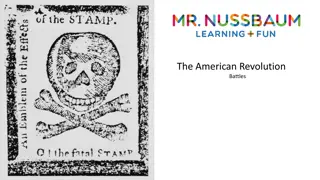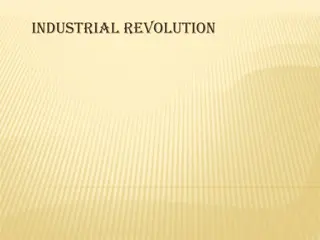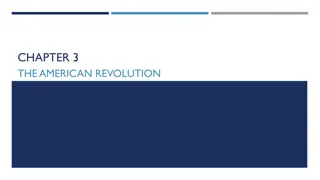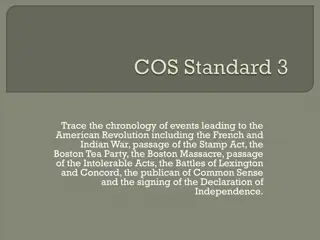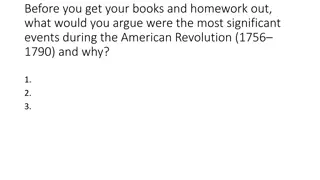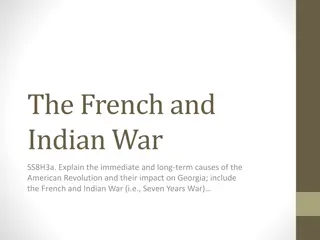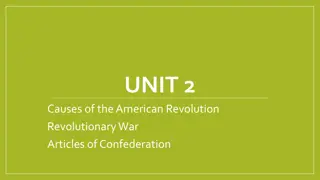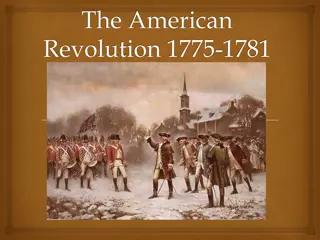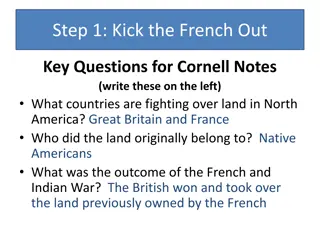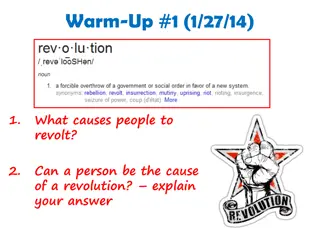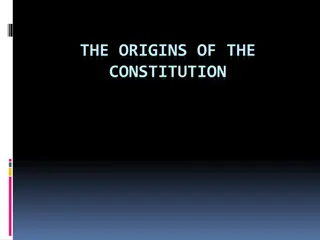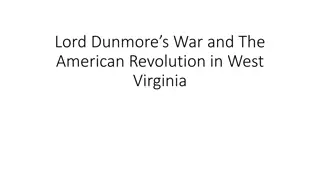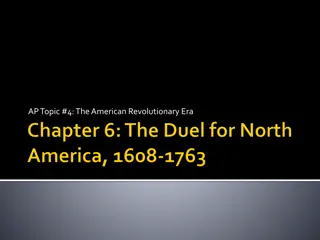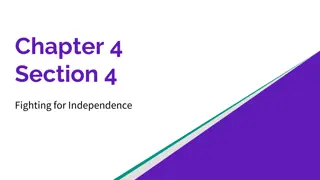Events Leading to the American Revolution
Content covers key events such as the French and Indian War, British imperial policies like the Stamp Act, colonists' resistance slogans, activities of groups like the Sons of Liberty, and pivotal moments like the Boston Tea Party. It also delves into the writing of the Declaration of Independence, major battles of the American Revolution, key individuals involved, and the concept of "no taxation without representation."
Download Presentation

Please find below an Image/Link to download the presentation.
The content on the website is provided AS IS for your information and personal use only. It may not be sold, licensed, or shared on other websites without obtaining consent from the author.If you encounter any issues during the download, it is possible that the publisher has removed the file from their server.
You are allowed to download the files provided on this website for personal or commercial use, subject to the condition that they are used lawfully. All files are the property of their respective owners.
The content on the website is provided AS IS for your information and personal use only. It may not be sold, licensed, or shared on other websites without obtaining consent from the author.
E N D
Presentation Transcript
Standards 0 SS4H4 The student will explain the causes, events, and results of the American Revolution. 0 a. Trace the events that shaped the revolutionary movement in America, including the French and Indian War, British Imperial Policy that led to the 1765 Stamp Act, the slogan no taxation without representation, the activities of the Sons of Liberty, and the Boston Tea Party. 0 b. Explain the writing of the Declaration of Independence; include who wrote it, how it was written, why it was necessary, and how it was a response to tyranny and the abuse of power. 0 c. Describe the major events of the American Revolution and explain the factors leading to American victory and British defeat; include the Battles of Lexington and Concord, Saratoga, and Yorktown. 0 d. Describe key individuals in the American Revolution with emphasis on King George III, George Washington, Benjamin Franklin, Thomas Jefferson, Benedict Arnold, Patrick Henry, and John Adams.
The French and Indian War 01754 to 1763 war fought over the land in America between the English and French. 0It was called the Seven Years War in Europe. 0Called the French and Indian War because the Indians helped the French in the war against the British. The Indians had nothing to lose. The British were taking their land, the French were not. 0The British won, but at a cost a lot of money.
0 Join, or Die Political Cartoon by Benjamin Franklin A political cartoon calling for American colonies to band together for protection against Indians and the French. First published in the Pennsylvania Gazette on May 9, 1754.
Proclamation of 1763 0Forbid colonists to settle west of the Appalachian Mountains. 0Created to protect colonists from the Indians 0Many colonists reacted with anger toward the Proclamation. They did not like being told what to do or where they could live.
Taxes 0 French and Indian War cost a lot of money. 0 Parliament (the British government) decided to tax to colonies to help pay for it. 0 The first tax was the Sugar Act of 1764. It placed a tax on molasses and sugar imported by the colonies. 0 Stamp Act of 1765 placed a tax on all printed material, such as newspapers and playing cards. 0 This tax upset the colonists even more.
No Taxation without Representation 0The colonists claimed no taxation without representation because they were being taxed but had no vote in Parliament and had no say in how the colonies were being governed. 0The colonists started a boycott, or a refusal to buy certain goods, from the British.
Sons of Liberty 0Samuel Adams began a secret society called the Sons of Liberty. 0The group was formed to protect the rights of the colonists and to take to the streets against the taxes by the British government.
Boston Massacre 0 Colonial men were shouting insults at the British soldiers. 0 They started throwing things, probably snow balls and rocks. 0 Someone yelled fire and the Red Coats (what the British soldiers were called) shot. 0 Five colonists were killed. These were the first Americans killed in the War for Independence. 0 Sam Adams started calling the incident the Boston Massacre. He used the incident to get more people angry at the British.
More Taxes 0Parliament began taxing tea. Tea was the most important beverage in the colonies. 0The colonists decided to boycott all British tea.
Boston Tea Party 0Colonists (Sons of Liberty) dressed up like Mohawk Indians and boarded three British ships full of tea. 0The colonists dumped all the tea into the harbor, about 90,000 pounds. 0King George III was furious!
The Intolerable Acts 0Laws passed to punish the colonists for the Boston Tea Party. 0The port of Boston was closed until the tea was paid for. 0The Quartering Act was put into place which forced colonists to quarter, or house and supply British soldiers.
First Continental Congress 0 A convention of delegates from twelve colonies (excluding Georgia) that met on September 5, 1774 in Philadelphia, Pennsylvania. 0 It was called in response to the Intolerable Acts. 0 Militias (citizen soldiers) were set up.
Shot Heard Round the World! 0 British soldiers in Boston were sent to capture the militias weapons. 0 Paul Revere, William Dawes, and Israel Bissell warned the colonists that, The Red Coats are coming. 0 British troops marched to Concord to capture colonial leaders, the ammunition. and weapons that were stored there. 0 The first two battles of the American Revolution were fought at Lexington and Concord, when the American militia met up with British forces.
Battles of Lexington and Concord 0 About 700 British Army regulars were given secret orders to capture and destroy military supplies that were reportedly stored by the Massachusetts militia at Concord. 0 Patriot colonials had received word weeks before the expedition that their supplies might be at risk and had moved most of them to other locations. They also received details about British plans on the night before the battle and were able to rapidly notify the area militias of the enemy movement.
Battles of Lexington and Concord 0 The first shots were fired just as the sun was rising at Lexington. The militia were outnumbered and fell back, and the regulars proceeded on to Concord, where they searched for the supplies. 0 At the North Bridge in Concord, approximately 500 militiamen fought and defeated three companies of the King's troops. The outnumbered regulars fell back from the minutemen.
The Second Continental Congress 0The Second Continental Congress met in Philadelphia to discuss the next move of the colonists. 0Appointed George Washington as commander of the colonial army. 0War with Great Britain was imminent.
The Declaration of Independence 0 The United States first needed to declare independence from Great Britain. 0 Thomas Jefferson, at the young age of 33, wrote the Declaration of Independence. 0 The Declaration of Independence was signed on July 4, 1776. 0 This is the day that the United States of America declared their independence from King George and Great Britain. 0 That is why we celebrate Independence Day on July 4th.
Battle of Saratoga 0The Battle of Saratoga is considered the turning point in the war for independence. 0It was actually two battles - the Battle of Freeman's Farm and the Battle of Bemis Heights. 0With the American victory, it proved to the world that the Americans were serious and powerful enough to defeat the highly trained British forces. 0Upon hearing of the American victory at Saratoga, the French declared recognition of the United States of America and fully supported their war of independence.
Battle of Yorktown 0 The last major battle of the American Revolution was fought at Yorktown. 0 Washington learned that the French Admiral de Grasse was sailing to Virginia to prevent the British army under the command of General Cornwallis from leaving Yorktown. 0 He and the French General Rochambeau rushed their troops to Yorktown to trap the British and prevent them from escaping over land.
Battle of Yorktown 0A siege of the city of Yorktown lasted from August - October 1781. 0Cornwallis was told by Sir Henry Clinton, the commander of all British forces in America that he was sending a relief British fleet to sail to Yorktown with supplies and men.
Battle of Yorktown 0 Admiral de Grasse's French fleet defeated the British fleet at the mouth of theChesapeake Bay so the relief that Cornwallis needed was unable to reach him. Cornwallis was surrounded. The American and French troops gradually closed in on him. 0 Cornwallis surrendered to Washington on Oct 19, 1781.


